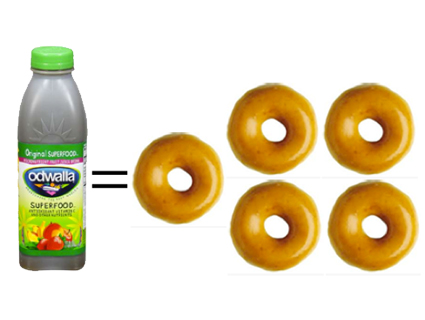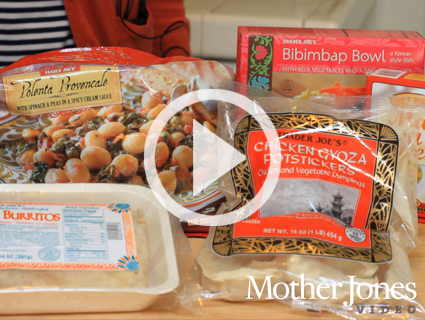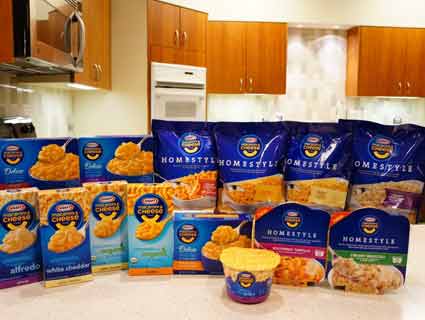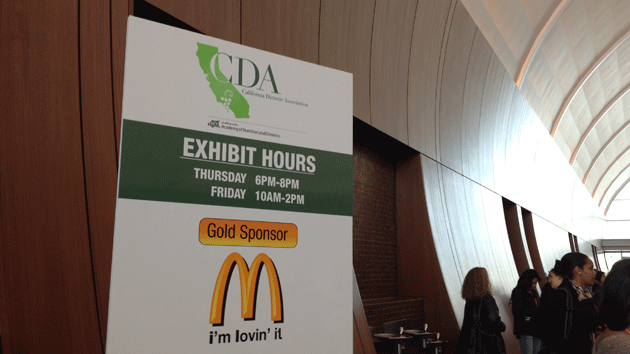
One recent Friday afternoon, in a Mariott Hotel ballroom in Pomona, California, I watched two women skeptically evaluate their McDonald’s lunches. One peered into a plastic bowl containing a salad of lettuce, bacon, chicken, cheese, and ranch dressing. The other arranged two chocolate chip cookies and a yogurt parfait on a napkin. “Eww,” she said, gingerly stirring the layers of yogurt and pink strawberry goop. The woman with the salad nodded in agreement, poking at a wan chicken strip with her plastic fork.
When I asked how they were liking their lunches, both women grimaced and assured me that they “never” go to McDonald’s. So why were they eating it today? Well, they didn’t really have a choice. The women were registered dietitians halfway through day two of the annual conference of the California Dietetic Association (CDA). They were hoping to rack up some of the continuing education credits they needed to maintain their certification. McDonald’s, the conference’s featured sponsor, was the sole provider of lunch. “I guess it’s good to know that they have healthier options now,” said the woman with the salad.
As I wandered the exhibition hall, I saw that McDonald’s wasn’t the only food company giving away freebies. Cheerful reps at the Hershey’s booth passed out miniature cartons of chocolate and strawberry milk. Butter Buds offered packets of fake butter crystals. The California Beef Council guy gave me a pamphlet on how to lose weight by eating steak. Amy’s Naturals had microwave brownies. The night before, Sizzler, California Pizza Kitchen, Boston Market, and other chain restaurants had hosted a free evening buffet for conference-goers: “Local Restaurant Samplings for Your Pleasure.”
And that wasn’t all. The sessions—the real meat and potatoes of the conference—had food industry sponsors as well. The Wheat Council hosted a presentation about how gluten intolerance was just a fad, not a real medical problem. The International Food Information Council—whose supporters include Coca-Cola, Hershey, Yum Brands, Kraft, and McDonald’s—presented a discussion in which the panelists assured audience members that genetically modified foods were safe and environmentally sustainable. In “Bringing Affordable Healthier Food to Communities,” Walmart spokespeople sang the praises of (what else?) Walmart.
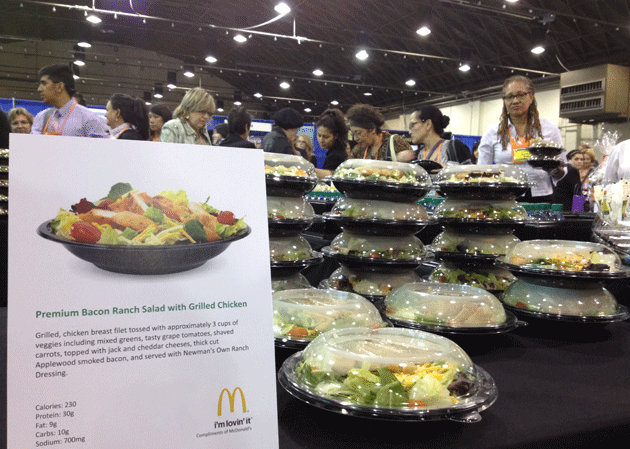
After lunch, I attended “Sweeteners in Schools: Keeping Science First in a Controversial Discussion.” Sponsored by the Corn Refiners Association, whose members produce and sell high-fructose corn syrup, it included a panel composed of three of the trade group’s representatives. The panelists bemoaned some schools’ decision to remove chocolate milk from their cafeteria menus. Later, one panelist said that she’d been dismayed to learn that some schools had banned sugary treats from classroom Valentine’s Day parties, which “could be a teachable moment for kids about moderation.” The moderator nodded in agreement, and added, “The bottom line is that all sugars contain the same calories, so you can’t say that there is one ingredient causing the obesity crisis.” The claim was presented as fact, despite mounting scientific evidence that high-fructose corn syrup prompts more weight gain than other sugars.
Later, I asked conference spokeswoman Pat Smith whether she thought it was fair to present such a one-sided discussion. She claimed that the sponsors did not influence any of the content in the program. “We like to think that our dietitians have a thought process and that we are presenting them with what is out there,” she said. “They need to make their own decisions on what they have listened to and apply that to their client base.”
“But it’s hard to make a decision if you’re only hearing one side of the story,” I countered.
She told me that she hadn’t known beforehand that the Corn Refiners panel would be composed entirely of its own representatives. And yet, when I asked her how the panel was chosen, she explained that it was approved by a committee. She also confirmed that the Corn Refiners had paid for the panel, but she declined to say how much. (She had previously declined me press credentials for the conference, explaining that the CDA would have its own journalists covering the event.)
With 75,000 members, the CDA’s parent organization, the national Academy of Nutrition and Dietetics (AND), is the world’s largest professional association for nutritionists and dietitians. It accredits undergraduate and graduate programs in nutrition science and awards credentials to dietitian degree candidates who pass its exam. In Washington, its lobbying arm is active on issues including childhood obesity, Medicare, and the farm bill.
It also has strong ties to the food industry. In 2013, Michele Simon, a public health lawyer and food politics blogger, launched an investigation (PDF) into the academy’s sponsorship policies. Simon found that its corporate support has increased dramatically over the past decade: In 2001, the academy listed just 10 sponsors. By 2011, there were 38, including Coca-Cola, PepsiCo, Nestlé, National Cattlemen’s Beef Association, Mars, and many others. Corporate contributions are its largest source of income, generating nearly 40 percent of its total revenue.
Simon also learned that in 2012, Nestlé paid $47,200 for its 2,500-square-foot display in the exhibition hall at the annual AND conference, and PepsiCo paid $38,000 for 1,600 square feet. The academy’s position papers, she noted, state that its sponsors do not influence its positions on controversial issues. And yet it often takes a pro-industry stance. When New York City was considering a ban on sales of oversized sodas, for example, the academy opposed it.
AND is not the only powerful nutritionists’ group with strong corporate ties. The sponsors of the School Nutrition Association‘s 2013 annual conference included PepsiCo, Domino’s Pizza, and Sara Lee. SNA made headlines recently when it asked Congress to lift the rule that students must take fruits and vegetables on the lunch line, and to ease the rules around sodium and whole grains.
Marion Nestle, a New York University nutritionist, wrote about nutritionists and corporate sponsorships in her 2007 book, Food Politics: How the Food Industry Influences Nutrition and Health. “I worry a lot about food industry co-optation of my profession,” she wrote to me in an email. “Food companies are smart. They know that if they can make friends and help inform dietitians and nutritionists that the people they are supporting or helping will be reluctant to suggest eating less of their products.”
Andy Bellatti, a dietitian and member of AND, recalls his shock the first time he attended the organization’s national conference, in 2008. “I could get continuing education credits for literally sitting in a room and listening to Frito-Lay tell me that Sun Chips are a good way to meet my fiber needs,” he says. “I thought, ‘No wonder Americans are overweight and diabetic. The gatekeepers for our information about food are getting their information from junk-food companies.'”
Bellatti took photos of the displays in the exhibition hall and posted them on his blog. The post started a conversation among academy members, many of whom were outraged when they learned about the sponsorships. They worried that if word got out that dietitians’ professional organization had been bought out by food corporations, the profession would lose credibility. So Bellatti and several other members founded Dietitians for Professional Integrity, consisting of academy members who want to change the sponsorship policies. They lobbied the leadership, but nothing changed—except for the rules about photography at the annual conference. The following year, when Bellatti took out his camera in the exhibition hall, he was told that photographs were prohibited.
Simon, the author of the 2013 report, found in a survey of AND members that four-fifths believed “sponsorship implies Academy endorsement of that company.” Just as many said that they thought members should have a say in selecting the sponsors, and most said that they would be willing to pay higher dues in order to avoid having so many corporations represented at the annual conference.
I asked AND spokesman Tom Ryan whether the academy has any plans to review its rules for food industry sponsors. He referred me to the academy’s corporate sponsorship website, which contains no suggestion of forthcoming changes. When I pressed him on it, Ryan replied, “I am not going to respond to that question.”
At the CDA conference I attended, most of the dietitians I talked to said that they did not realize the sessions were sponsored by companies. “I hope they’re telling us the real science,” said one graduate student attendee.
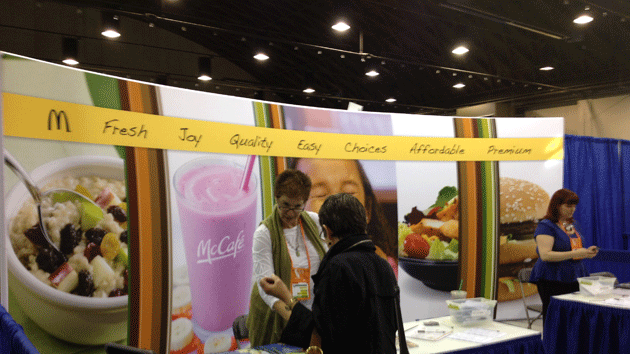
Toward the end of the day, I spoke to a 65-year-old retired dietitian from Orange County. She told me she’d been attending CDA’s annual conferences for 30 years. Shaking her head, she said that she didn’t approve of the trend of junk-food sponsors. “I guess they need the money, but this is pathetic,” she said, rolling her eyes. She found the McDonald’s lunch particularly deplorable. “A dietitian you’d expect to be principled,” she said. “But here I feel like we’re sleeping with the enemy.”


